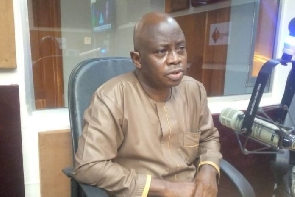 Stephen Yakubu, Upper East Regional Minister
Stephen Yakubu, Upper East Regional Minister
Stephen Yakubu, Upper East Regional Minister, has appealed to factions involved in the Bawku Chieftaincy conflict to resolve their differences themselves and let peace prevail.
“No one will come here and make peace with us, except ourselves,” the Regional Minister said, adding that, “people will come and listen to us and go, people will come and talk to us and go, people will see us and go.
“But we will have to make the peace ourselves and live in Bawku, if we do not do that no one will come and make the peace for us.”
He said women and children are dying as a result of the conflict; healthcare delivery services are forcing health workers to flee, leaving expectant mothers to their fate.
The Regional Minister made the appeal when he led the Upper East Regional Security Council, the Bawku Municipal Security Council and other stakeholders including the Ghana Health Service and the Ghana Education Service to Bawku to engage the two factions.
This was necessitated by a recently renewed clashes that reportedly led to the death of 10 people including a 12-year-old boy.
Stephen Yakubu explained that apart from being the hub of agricultural production, Bawku was once the commercial business centre of the region that attracted traders from across the country and neighbouring Burkina Faso and Togo.
Stephen Yakubu said it was regrettable that the conflict continued to destroy the legacy and brought untold hardship to the people in the area, the region in general, and across all sectors.
He said education and healthcare in the area had been seriously impacted with teachers and health workers fleeing the area while many are refusing postings to the area, as a result retarding development prospects and deepening the poverty cycle of families.
“It is a big problem for us, doctors are gone, schools have closed, people cannot do their business and travelling sometimes is a problem, lives are being lost because when you are sick, you cannot go to the hospital,” he lamented.
The Regional Minister explained that all stakeholders involved in the conflict should help resolve the issue as their little contribution to the development of the area.
Sulemana Majeed, Senior Public Health Nurse at the Upper East Regional Health Directorate, regretted the effects of the conflict and said the situation had contributed to increased maternal and child deaths.
He said: “About 70 mothers have lost their lives in the space of two years for trying to give birth but did not get proper care because health workers had fled the area, more than 300 of HIV/AIDS patients cannot access healthcare facilities for their routine drugs.”
“When we want any health worker to go to Bawku or adjoining districts, they refuse because they feel unsafe there and when this issue is not addressed, there will be a time we may not get any health worker in Bawku,” he added.
Since the re-emergence of the conflict in November 2021, countless numbers of people have been killed; and economic activities, education and healthcare are adversely affected.
Measures including curfews, restrictions on the movement of people and vehicles, and non-wearing of smocks among others have been imposed in the area while batches of armed forces personnel are stationed there to help curb the conflict.
The government had also advised the feuding factions to go by the Supreme Court verdict on the matter in 2003 to ensure peace but all efforts seemed not to be yielding positive results.